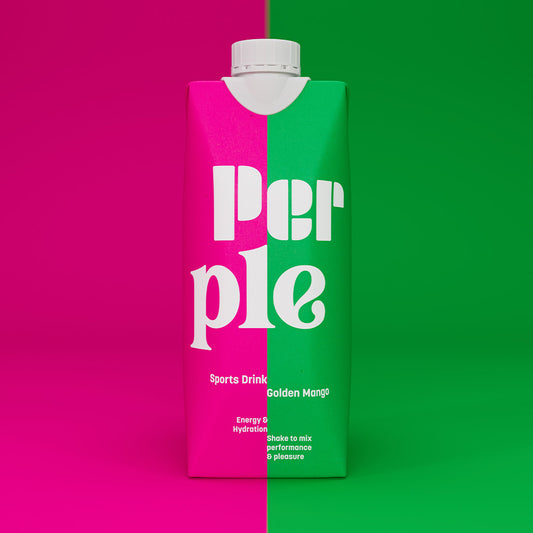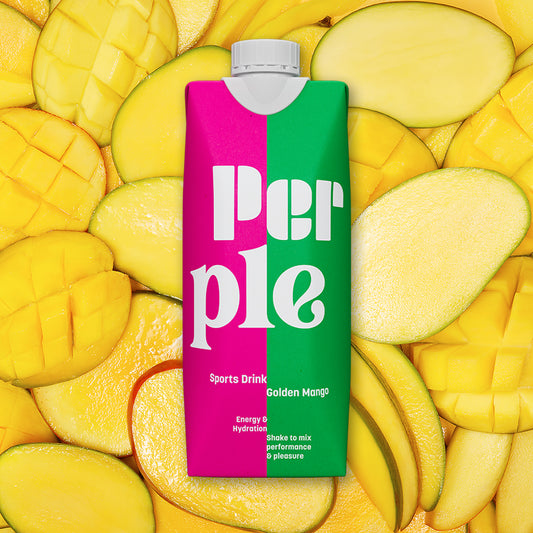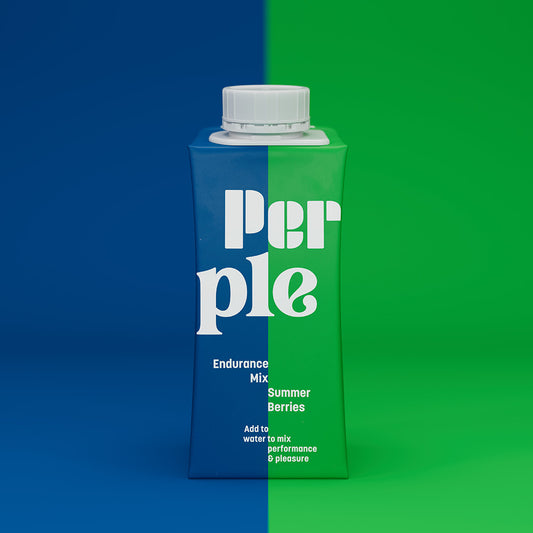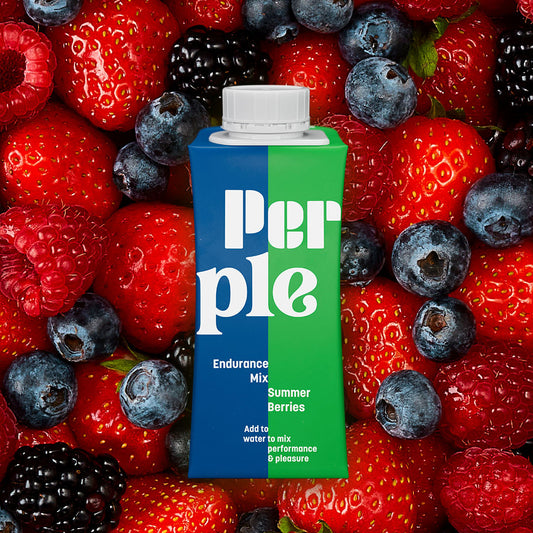What are you putting in your body?

The stuff that's a health hazard:
Maltodextrin (from GMO corn)
Maltodextrin (from GMO corn)
Maltodextrin is used as the main ‘energy source’ in leading energy gels & energy drink powders. It's a cheap bioengineered white powder, introduced in the 70s as a food thickener in processed foods. Like instant puds and sauces. [33] And much of it is made using GMO Corn.[34]
Regulators might have considered it as safe in the past, but in the context of it being used in 'low moderation'.
But our exposure to Maltodextrin today, is higher than it has ever been. Especially with its high inlcusion in sports nutrition and drinks, which we now consume in greater quantities, and more often.
The problem is that Maltodextrin makes our stomachs more susceptible to disease, owing to changing the balance of gut bacteria. Inflammatory bowel diseases like Crohn's or ulcerative colitis.[1] [2] [3]
Aspartame (from Bio Diesel)
Aspartame (from Bio Diesel)
To make synthetic or ultra-processed ingredients look and taste better, many producers use artificial colours, flavours & sweeteners. Aspartame is the sweetener that is used by most sports drink and soft drink companies, which the World Health Organisation recently declared as ‘potentially carcinogenic.’ [21]
Aspartame is made by modifying acids from plants, but with the chemical - methyl esther - a biodiesel, typically used in industrial, household cleaners, & as power generation.[22] [23] [24]
Artificial Preservatives (from Petrol or Coal)
Artificial Preservatives (from Petrol or Coal)
The stuff that doesn't work:
Caffeine
Caffeine
Caffeine comes from coffee beans, cacao beans, tea leaves, and gaurana berry, to make it sound more exotic. But it isn’t real energy. It heightens nervous systems giving us a fake or artificial rush of energy. While this can help to drive more effort in exercise, it maxes out at one tall starbucks coffee (a 200mg dose) and can’t be sustained. One cup in the morning will last throughout the day and maximize any performance benefits. Then, to supplement at excess doses won’t necessarily give you any addedbenefit, and you run the risk of side effects. Such as irritability, tremor, heart-rate increases, headaches and fatigue.[8] [9] [10]
Taurine
Taurine
Antioxidants
Antioxidants
There is no doubt among researchers that prolonged and intense exercise causes oxidative stress. Which in turn can result in increased muscle fatigue. Therefore, some promote anti-oxidant supplementation during exercise, to overcome these effects. Yet, after a thorough review of the scientific literature, there is little evidence to conclude that this approach helps.[11] [12] In fact, we find strong evidence that supplementation can actually inhibit the body’s natural biological defences to oxidative stress. What this means is that natural adaptive responses by your muscles can be lessened, and your capacity for endurance reduced.[13] [14] [15] If you’re consuming well-balanced daily meals, you should be receiving adequate supplies of these anti-oxidants.
Vitamin B
Vitamin B
There is sound scientific evidence to conclude that B-Vitamins play an important role in energy metabolism. Then, it seems reasonable that any deficiencies might lessen exercise performance. But, if you’re getting everything you need from your normal diet, excess doses above recommended upper limits, could be harmful. For instance, excess B2 can cause diarrhoea and polyuria, B3 liver problems, gout and irregular heartbeat, and B6 nerve damage.[16] [17] [18] When it comes to vitamins, we believe you should only supplement for known deficiencies. Otherwise toxic doses can result in serious health problems.
References
References
- Arnold AR, Chassaing B. Maltodextrin, Modern Stressor of the Intestinal Environment. Cell Mol Gastroenterol Hepatol. 2019;7(2):475-476.
- Nickerson KP, McDonald C. Crohn’s disease-associated adherent-invasive Escherichia coli adhesion is enhanced by exposure to the ubiquitous dietary polysaccharide maltodextrin. PLoS One. 2012;7(12):e52132.
- Laudisi F, Di Fusco D, Dinallo V, Stolfi C, Di Grazia A, Marafini I, Colantoni A, Ortenzi A, Alteri C, Guerrieri F, Mavilio M, Ceccherini-Silberstein F, Federici M, MacDonald TT, Monteleone I, Monteleone G. The Food Additive Maltodextrin Promotes Endoplasmic Reticulum Stress-Driven Mucus Depletion and Exacerbates Intestinal Inflammation. Cell Mol Gastroenterol Hepatol. 2019;7(2):457-473.
- Asker E. Jeukendrup (2008) Carbohydrate feeding during exercise, European Journal of Sport Science, 8:2, 77-86.
- Fritzsche RG, Switzer TW, Hodgkinson BJ, Lee SH, Martin JC, Coyle EF. Water and carbohydrate ingestion during prolonged exercise increase maximal neuromuscular power. J Appl Physiol (1985). 2000 Feb;88(2):730-7.
- Boschmann M, Steiniger J, Hille U, Tank J, Adams F, Sharma AM, Klaus S, Luft FC, Jordan J. Water-induced thermogenesis. J Clin Endocrinol Metab. 2003 Dec;88(12):6015-9.
- T. D. Noakes (2007) Drinking guidelines for exercise: What evidence is there that athletes should drink “as much as tolerable”, “to replace the weight lost during exercise” or “ad libitum”?, Journal of Sports Sciences, 25:7, 781-796.
- Bell DG, McLellan TM. Effect of repeated caffeine ingestion on repeated exhaustive exercise endurance. Med Sci Sports Exerc. 2003 Aug;35(8):1348-54.
- Graham TE, Spriet LL. Metabolic, catecholamine, and exercise performance responses to various doses of caffeine. J Appl Physiol (1985). 1995 Mar;78(3):867-74.
- Kovacs EM, Stegen JHCH, Brouns F. Effect of caffeinated drinks on substrate metabolism, caffeine excretion, and performance. J Appl Physiol (1985). 1998 Aug;85(2):709-15.
- Theodorou AA, Nikolaidis MG, Paschalis V, Koutsias S, Panayiotou G, Fatouros IG, Koutedakis Y, Jamurtas AZ. No effect of antioxidant supplementation on muscle performance and blood redox status adaptations to eccentric training. Am J Clin Nutr. 2011 Jun;93(6):1373-83.
- Gomes EC, Allgrove JE, Florida-James G, Stone V. Effect of vitamin supplementation on lung injury and running performance in a hot, humid, and ozone-polluted environment. Scand J Med Sci Sports. 2011 Dec;21(6):e452-60.
- Braakhuis AJ. Effect of vitamin C supplements on physical performance. Curr Sports Med Rep. 2012 Jul-Aug;11(4):180-4.
- McGinley C, Shafat A, Donnelly AE. Does antioxidant vitamin supplementation protect against muscle damage? Sports Med. 2009;39(12):1011-32.
- Paulsen G, Cumming KT, Holden G, Hallén J, Rønnestad BR, Sveen O, Skaug A, Paur I, Bastani NE, Østgaard HN, Buer C, Midttun M, Freuchen F, Wiig H, Ulseth ET, Garthe I, Blomhoff R, Benestad HB, Raastad T. Vitamin C and E supplementation hampers cellular adaptation to endurance training in humans: a double-blind, randomised, controlled trial. J Physiol. 2014 Apr 15;592(8):1887-901.
- Committee on Toxicity of Chemicals in Food, Consumer Products and the Environment. Statement on Vitamin B6 (Pyridoxine) Toxicity.
- Habibe MN, Kellar JZ. Niacin Toxicity. 2021 Aug 1. In: StatPearls [Internet]. Treasure Island (FL): StatPearls Publishing; 2021 Jan–.
- Lheureux P, Penaloza A, Gris M. Pyridoxine in clinical toxicology: a review. Eur J Emerg Med. 2005 Apr;12(2):78-85.
- Martin BJ, Tan RB, Gillen JB, Percival ME, Gibala MJ. No effect of short-term green tea extract supplementation on metabolism at rest or during exercise in the fed state. Int J Sport Nutr Exerc Metab. 2014 Dec;24(6):656-64.
- Randell RK, Hodgson AB, Lotito SB, Jacobs DM, Rowson M, Mela DJ, Jeukendrup AE. Variable duration of decaffeinated green tea extract ingestion on exercise metabolism. Med Sci Sports Exerc. 2014 Jun;46(6):1185-93.
- https://www.medicalnewstoday.com/articles/who-declares-aspartame-carcinogen
- https://knowledge4policy.ec.europa.eu/glossary-item/methyl-esters_en
- https://www.etipbioenergy.eu/fact-sheets/fatty-acid-methyl-esters-fame-fact-sheet
- https://www.sciencedirect.com/science/article/abs/pii/B9780444521149500256
- https://www.sciencedirect.com/science/article/abs/pii/B9780128115183000016
- https://dspace.nuft.edu.ua/server/api/core/bitstreams/6687a2a2-07a1-4db4-a956-583459128b71/content
- https://www.tandfonline.com/doi/abs/10.1179/1077352512Z.00000000034
- https://www.sciencedirect.com/science/article/pii/S2772753X2200003X
- https://www.cspinet.org/article/artificial-colorings-synthetic-food-dyes
- https://www.dhs.wisconsin.gov/chemical/toluene.htm#:~:text=Toluene%20is%20found%20naturally%20in,glues%2C%20inks%20and%20stain%20removers
- https://www.ncbi.nlm.nih.gov/pmc/articles/PMC9003278/
- https://www.ncbi.nlm.nih.gov/pmc/articles/PMC9003278/
- https://journals.humankinetics.com/view/journals/ijsnem/20/4/article-p322.xml
- https://dergipark.org.tr/en/pub/asbid/issue/78116/1239679
Whats in Perple?
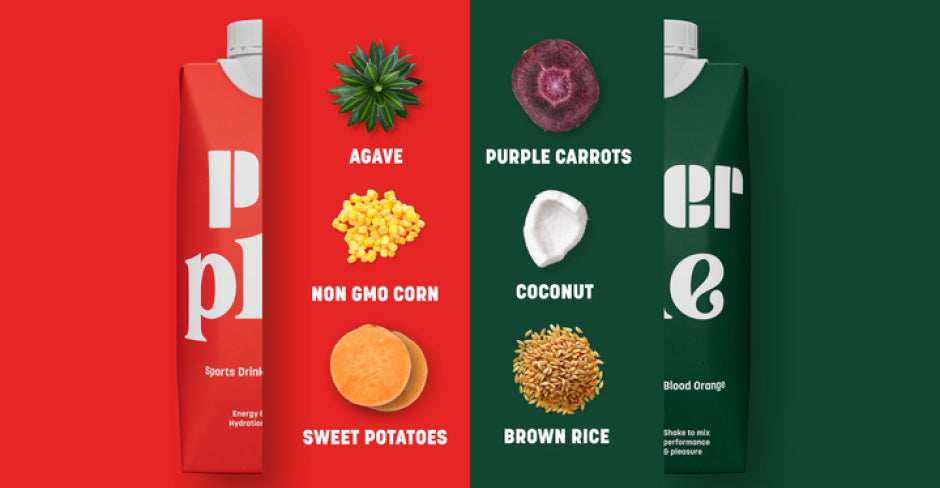
-
Multiple plant carbs and BCAAs
The long, uninterrupted energy that you get from Perple is because of 3 very unique characteristics. First, the unrefined superfood carbs we use, mean’s you get constant energy, without the crashes. Second, we use a special blend of plant-based amino acids as another source of energy. The added bonus is that these natural carbs and aminos also work together to speed up your oxidation of fats. This means you’re getting a triple whammy of energy sources in Perple. That’s more energy per gram of carbohydrate than anything else out there.
Carbs are the preferred energy source for our muscles [9], and not just simple unrefined sugars. All types of carbs are eventually broken down into glucose, which is converted to energy to power our muscles during exercise. If you’re not taking in enough of the right carbs, then you will lose energy, power and endurance. A superfood like sweet potato has a broad array of carbs, including starches and fibre. They are digested, absorbed and metabolized by our bodies at different rates. Giving you steady energy, good gut health and helping to maintain lean body mass.
By contrast, the energy you get from other products, like gels and sports drinks, is short lived. Because they contain ultra-processed sugars like glucose, or synthetic carbs like maltodextrin. They’re high on the Glycemic Index (‘GI’), meaning you’ll burn through them fast. Moderate GI foods enhance performance times far better than High GI foods [1]. And multiple carbs help to improve times, as proven in controlled trials, compared to simple carbs [2]. Basically, you need multi-carb food sources if you want constant energy in prolonged exercise. Which is why Perple is packed with superfood ingredients like Sweet Potato, Coconut Water, Brown Rice and Agave.
Feel depleted of energy towards the end of your training, exercise and competition? We wanted to change this with Branched Chain Amino Acids (BCAAs). It’s widely documented that BCAAs are the building blocks of protein and are critical in protein synthesis. The process of repairing damaged muscles resulting from prolonged or intense exercise. Yet, what is less well known is that they can also be valuable as another source of energy, in the later stages of exercise. Especially when your Glycogen stores are low.
What we’ve learned is that the body breaks down amino acids, from skeletal muscle protein, to use as energy for as much as 10% of total requirements. However, if your body breaks down and uses more than it needs to retain for proper protein synthesis, your muscle mass could be reduced. This means you could lose strength and power. What’s more, is that improvement in times to exhaustion in controlled trials, has been proven, over subjects whom did not supplement with BCAAs [3] [4]. This is why we add plant-based Branched Chain Amino Acids in Perple. To help for increased energy during prolonged activities, and in a giving you a head start on muscle repair, once you’re done.
The combination of natural unrefined carbs and plant aminos in Perple, will help you to burn more fat for extra energy, giving you a leaner body and increasing your endurance. Who doesn’t want that? But first, lets debunk the myth that low-carb diets have sporting performance benefits. Fats are oxidized at half the rate of carbs and we use 10% more oxygen in processing them. It means you won’t get the same energy output as you would receive from ingesting carbs. It is true that you can improve your capacity for fat oxidation, by training with restricted carb availability. But there is no clear evidence to support the suggested performance benefits of a low-carb diet in sports and exercise [5] [6]. But there is a strong body of evidence to support the benefits of carbs [7] [8] [9].
Yet, the management of body fat does have a supportive role to play in increasing your endurance. Higher body fat percentages can result in reduced VO2 max and lower endurance capacity [10] [11].
Firstly, the balanced starches and fibres in Perple help to improve the rate at which your body burns fat [12] [13] [14]. Secondly, the plant-based BCAAs in Perple are also doing the same [15]. So, our natural carbs and plant aminos are working in unison, to help you burn fat at a higher rate and give you more energy.
-
Unique blend of electrolytes, from our Superfood ingredients
If you want to go out and hit a PB, it is important to make sure that your body is functioning at its peak. Minerals, otherwise known as electrolytes, can also play a key role here. They help to distribute nutrients to the right organs, stop you from overheating, help to regulate your heartbeat, and provide proper muscle contraction. All of this means that your body can work harder for longer during your workouts.
However, we can lose these important minerals in sweat, and in some cases, we might not be getting enough from our daily diets. For instance, if you’ve taken potatoes out of your meal plan, you won’t be taking in enough Potassium. Perple’s superfood ingredients are packed full of minerals like Sodium, Potassium, Magnesium and Calcium. These are often stripped away in ultra-processed sugary sports drinks or maltodextrin-infused energy gels. Some add back Sodium, claiming that if you don’t replenish what was lost through sweat, you will suffer cramps. Not true. There is a strong body of evidence to refute this claim, and clear evidence that cramping is rather a condition of neuromuscular fatigue [1] [2] [3]. Overcome by adapted training, warm-up, stretching and keeping your muscles well fed. Perple gives the muscles what they need and when.
Now, lets look at why the minerals in Perple are helpful to improve body functions and sustain physical effort for prolonged periods. Starting with Sodium. Sodium is essential for normal water distribution and fluid balance. This helps to regulate temperature and maintain proper body functions. Because if your body overheats, then your performance will decline. [4] [5]
Potassium helps in regulating heartbeat, in muscle and nerve function, and in metabolising carbs. During exercise, Potassium plays a major role in making nerve signals needed for proper contractions in your skeletal and heart muscles. Along with helping to convert carbs to energy, this mineral is vital to help keep your muscles working harder for longer. [6] [7]
Magnesium is critical in biochemical reactions, including muscle, nerve and immune function, blood glucose control and energy metabolism. As with Potassium, it is important to power your muscles efficiently during exercise. [8] [9]
Calcium is important for vascular and muscle function, nerve transmission and bone strength. The latter is of particular importance for many of us who take on the more risky challenges. [10] [11]
-
Naturally occurring plant phytochemical and other nutrients
Perple gets busy with the process of muscle damage repair, before your workout has even finished. Because extra fitness gains come from a fast recovery from the last set, so that you can smash the next one.
We thought about how we could adapt the nutrition you put in during exercise, to make the recovery faster once you’ve finished. Eureka! We’re back to the power of plants again. The superfood ingredients in Perple are working in several ways to give you that head-start on recovery, and compliment your post-exercise protein shake routines.
Firstly, there are naturally occurring proteins in our ingredients, that can help with muscle repair. But only in amounts that your body will be able to digest during exercise, without any stomach problems. Secondly, our unique plant-based branched chain amino acids (BCAAs), help to further conserve your skeletal muscle proteins. This is important for proper protein synthesis to occur, in the repair of your muscles. Any deficits could result in muscle mass and power being reduced.
However, the most exciting benefit is in the anti-inflammation properties of naturally occurring plant phytochemicals. In the context of prolonged exercise, reduced muscle inflammation means you will experience less fatigue and improved recovery between sets. [1] [2] [3]
One of the remarkable observations of Perple in our early trials, was in our subjects’ ability to take on intense sets, time after time.
-
The right carbs & water together are vital
One of the main reasons you can get an upset stomach, is by ingesting large amounts of a single carbohydrate alone, which is more than your small intestine can absorb. And especially without enough water, which is vital to help this biological process. This is a fairly typical experience of High-GI (Glycemic Index) Gels that are mainly made of simple sugars, like glucose. Because the energy produced is burned through quickly, we tend to over consume them, and with insufficient water. What your small intestine cannot process, shifts to your large one, and that’s when you hit trouble. You get gastrointestinal distress, with symptoms such as bloating, cramping, nausea, vomiting and diarrhoea.
Some gel manufacturers attempt to overcome this problem by using a synthetic man-made carb called maltodextrin. It’s higher molecular weight means that it can pass through your small intestine faster than glucose. But it’s high GI status also brings the problem of energy spikes and crashes. To make matters worse, Maltodextrin can contribute to Crohn’s disease and ulcerative colitis. [1] [2] [3]
Here at Perple we don’t use anything synthetic that can negatively impact your health. We select superfood ingredients that contain a variety of different carbs. We’re also very precise in balancing the amounts of each. Because these ratios are important for steady digestion and in helping your small intestine to absorb more, without being overloaded. For instance, certain combinations of Glucose and Fructose increase the capacity for absorption.[4] This is especially important for multiple hours of activity, when you need to take in higher amounts of carbs, for increased energy. We also focus on the chemical importance of water. Because it plays a vital role in your body’s digestion process, helps your small intestine to absorb carbs, and is critical in converting those carbs to energy for your muscles. Carbs and water together help your muscles work harder for longer. As opposed to just carbs alone.[5] [6]
- Kirwan JP, Cyr-Campbell D, Campbell WW, Scheiber J, Evans WJ. Effects of moderate and high glycemic index meals on metabolism and exercise performance. Metabolism. 2001 Jul;50(7):849-55.
- Currell K, Jeukendrup AE. Superior endurance performance with ingestion of multiple transportable carbohydrates. Med Sci Sports Exerc. 2008 Feb;40(2):275-81.
- Gualano AB, Bozza T, Lopes De Campos P, Roschel H, Dos Santos Costa A, Luiz Marquezi M, Benatti F, Herbert Lancha Junior A. Branched-chain amino acids supplementation enhances exercise capacity and lipid oxidation during endurance exercise after muscle glycogen depletion. J Sports Med Phys Fitness. 2011 Mar;51(1):82-8.
- AbuMoh’d, Mohammad Fayiz, Matalqah, Laila and Al-Abdulla, Zainalabidden. “Effects of Oral Branched‐Chain Amino Acids (BCAAs) Intake on Muscular and Central Fatigue During an Incremental Exercise” Journal of Human Kinetics, vol.72, no.1, 2020, pp.69-78.
- Burke LM. Fueling strategies to optimize performance: training high or training low? Scand J Med Sci Sports. 2010 Oct;20 Suppl 2:48-58.
- Brukner P. Challenging beliefs in sports nutrition: are two ‘core principles’ proving to be myths ripe for busting? Br J Sports Med. 2013 Jul;47(11):663-4.
- Cermak NM, van Loon LJ. The use of carbohydrates during exercise as an ergogenic aid. Sports Med. 2013 Nov;43(11):1139-55.
- Jeukendrup A. A step towards personalized sports nutrition: carbohydrate intake during exercise. Sports Med. 2014;44 Suppl 1(Suppl 1):S25-S33.
- Stellingwerff T, Cox GR. Systematic review: Carbohydrate supplementation on exercise performance or capacity of varying durations. Appl Physiol Nutr Metab. 2014 Sep;39(9):998-1011.
- Charlton K, Batterham M, Langford K, Lateo J, Brock E, Walton K, Lyons-Wall P, Eisenhauer K, Green N, McLean C. Lean Body Mass Associated with Upper Body Strength in Healthy Older Adults While Higher Body Fat Limits Lower Extremity Performance and Endurance. Nutrients. 2015 Aug 26;7(9):7126-42.
- Mondal H, Mishra SP. Effect of BMI, Body Fat Percentage and Fat Free Mass on Maximal Oxygen Consumption in Healthy Young Adults. J Clin Diagn Res. 2017 Jun;11(6):CC17-CC20.
- Higgins JA, Higbee DR, Donahoo WT, Brown IL, Bell ML, Bessesen DH. Resistant starch consumption promotes lipid oxidation. Nutr Metab (Lond). 2004 Oct 6;1(1):8.
- Gentile, C.L., Ward, E., Holst, J.J. et al. Resistant starch and protein intake enhances fat oxidation and feelings of fullness in lean and overweight/obese women. Nutr J 14, 113 (2015).
- Giles ED, Brown IL, MacLean PS, et al. The In Vivo Net Energy Content of Resistant Starch and Its Effect on Macronutrient Oxidation in Healthy Adults. Nutrients. 2019;11(10):2484. Published 2019 Oct 16.
- Gualano AB, Bozza T, Lopes De Campos P, Roschel H, Dos Santos Costa A, Luiz Marquezi M, Benatti F, Herbert Lancha Junior A. Branched-chain amino acids supplementation enhances exercise capacity and lipid oxidation during endurance exercise after muscle glycogen depletion. J Sports Med Phys Fitness. 2011 Mar;51(1):82-8.
- P. Edouard, Exercise associated muscle cramps: Discussion on causes, prevention and treatment, Science & Sports, Volume 29, Issue 6, 2014, Pages 299-305.
- Schwellnus MP. Cause of exercise associated muscle cramps (EAMC)–altered neuromuscular control, dehydration or electrolyte depletion? Br J Sports Med. 2009 Jun;43(6):401-8.
- chwellnus MP, Drew N, Collins M. Muscle cramping in athletes–risk factors, clinical assessment, and management. Clin Sports Med. 2008 Jan;27(1):183-94, ix-x.
- Wendt, D., van Loon, L.J. & Marken Lichtenbelt, W.D. Thermoregulation during Exercise in the Heat. Sports Med 37, 669–682 (2007).
- Sharp RL. Role of sodium in fluid homeostasis with exercise. J Am Coll Nutr. 2006 Jun;25(3 Suppl):231S-239S.
- Stone MS, Martyn L, Weaver CM. Potassium Intake, Bioavailability, Hypertension, and Glucose Control. Nutrients. 2016 Jul 22;8(7):444.
- McKenna MJ. The roles of ionic processes in muscular fatigue during intense exercise. Sports Med. 1992 Feb;13(2):134-45.
- Mooren FC, Golf SW, Lechtermann A, Völker K. Alterations of ionized Mg2+ in human blood after exercise. Life Sci. 2005 Jul 29;77(11):1211-25.
- Lukaski HC, Nielsen FH. Dietary magnesium depletion affects metabolic responses during submaximal exercise in postmenopausal women. J Nutr. 2002 May;132(5):930-5.
- Flynn A. The role of dietary calcium in bone health. Proc Nutr Soc. 2003 Nov;62(4):851-8. doi: 10.1079/PNS2003301.
- Maciej S. Buchowski, CHAPTER 1:Calcium in the Context of Dietary Sources and Metabolism , in Calcium: Chemistry, Analysis, Function and Effects, 2015, pp. 3-20.
- Bellik Y, Boukraâ L, Alzahrani HA, Bakhotmah BA, Abdellah F, Hammoudi SM, Iguer-Ouada M. Molecular mechanism underlying anti-inflammatory and anti-allergic activities of phytochemicals: an update. Molecules. 2012 Dec 27;18(1):322-53.
- Bouic PJ, Clark A, Lamprecht J, Freestone M, Pool EJ, Liebenberg RW, Kotze D, van Jaarsveld PP. The effects of B-sitosterol (BSS) and B-sitosterol glucoside (BSSG) mixture on selected immune parameters of marathon runners: inhibition of post marathon immune suppression and inflammation. Int J Sports Med. 1999 May;20(4):258-62.
- Barnard ND, Goldman DM, Loomis JF, Kahleova H, Levin SM, Neabore S, Batts TC. Plant-Based Diets for Cardiovascular Safety and Performance in Endurance Sports. Nutrients. 2019 Jan 10;11(1):130.
- Arnold AR, Chassaing B. Maltodextrin, Modern Stressor of the Intestinal Environment. Cell Mol Gastroenterol Hepatol. 2019;7(2):475-476.
- Nickerson KP, McDonald C. Crohn’s disease-associated adherent-invasive Escherichia coli adhesion is enhanced by exposure to the ubiquitous dietary polysaccharide maltodextrin. PLoS One. 2012;7(12):e52132.
- Laudisi F, Di Fusco D, Dinallo V, Stolfi C, Di Grazia A, Marafini I, Colantoni A, Ortenzi A, Alteri C, Guerrieri F, Mavilio M, Ceccherini-Silberstein F, Federici M, MacDonald TT, Monteleone I, Monteleone G. The Food Additive Maltodextrin Promotes Endoplasmic Reticulum Stress-Driven Mucus Depletion and Exacerbates Intestinal Inflammation. Cell Mol Gastroenterol Hepatol. 2019;7(2):457-473.
- Asker E. Jeukendrup (2008) Carbohydrate feeding during exercise, European Journal of Sport Science, 8:2, 77-86.
- Fritzsche RG, Switzer TW, Hodgkinson BJ, Lee SH, Martin JC, Coyle EF. Water and carbohydrate ingestion during prolonged exercise increase maximal neuromuscular power. J Appl Physiol (1985). 2000 Feb;88(2):730-7.
- Boschmann M, Steiniger J, Hille U, Tank J, Adams F, Sharma AM, Klaus S, Luft FC, Jordan J. Water-induced thermogenesis. J Clin Endocrinol Metab. 2003 Dec;88(12):6015-9.
References
B. Unique blend of electrolytes, from our Superfood ingredients.
C. Naturally occurring plant phytochemical and other nutrients.
D. The right carbs & water together are vital.
Developed at

Certified by

What Perple replaces:
- Choosing a selection results in a full page refresh.
- Opens in a new window.






